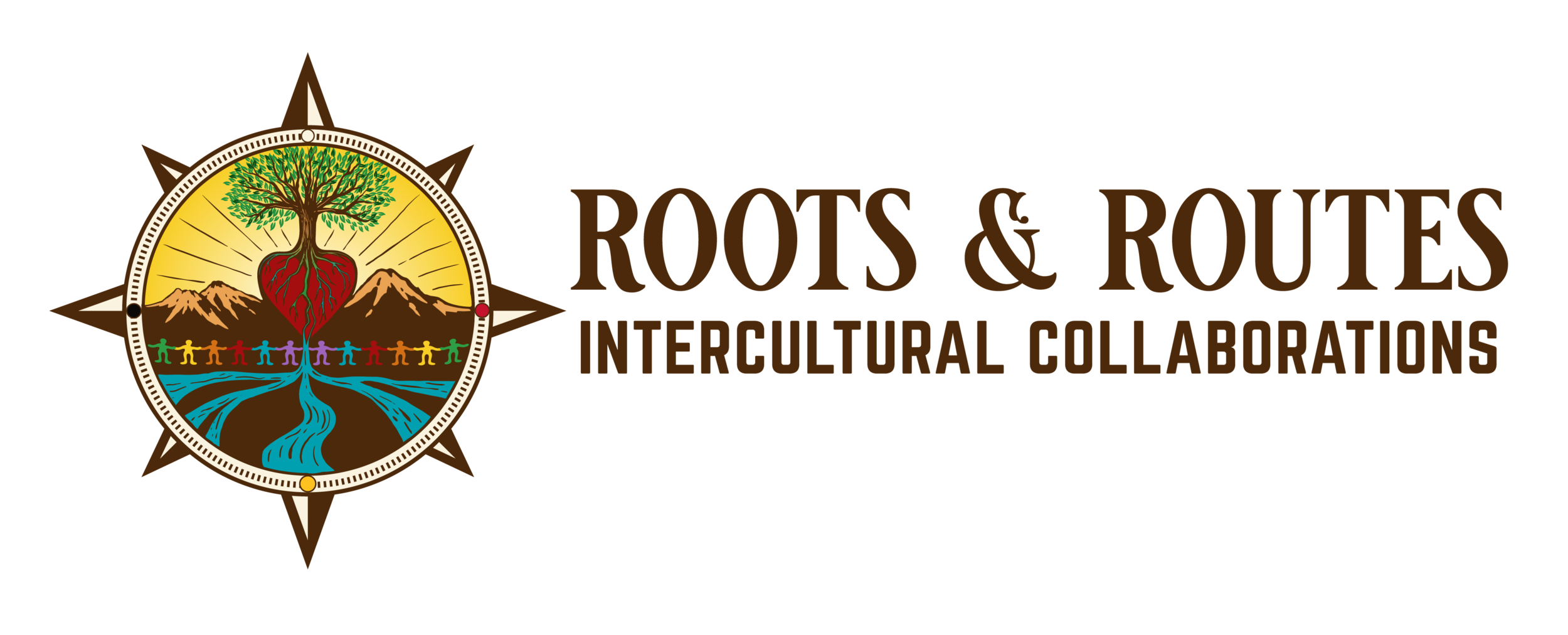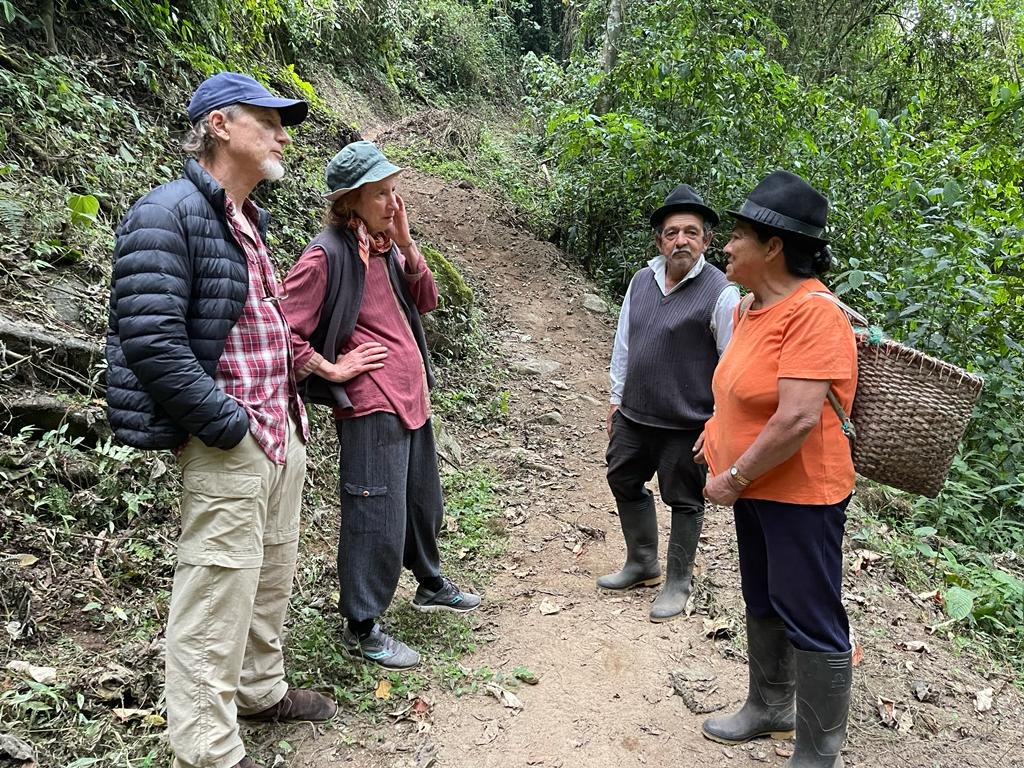Interculturality as Cultivating Humility to Cultural Differences: Teachings from Leonore Cavallero
On the 15th of August our 2021 Summer cohort of the Youth Visionary Collective were treated to a conversation with Leonore Cavallero, who sits on Roots & Routes IC’s Council of Advisors. Leonore has a life-time of experience as an intercultural trainer and counselor with overseas programs like the Peace Corps and the School for International Training Study Abroad program based in Vermont, USA.
Leonore and her husband, Rick, with long-time friends and neighbors in the Intag Cloudforest Region of the Chocó Bioregion in August 2021. Together they form part of a community forest reserve that stewards and protects the lands and rivers that are threatened by national and international mining interests.
Currently she resides in Quito, Ecuador with her family and serves on the Board of Directors at Amazon Learning. Leonore’s proposal for the YVC was that interculturality can be thought of as cultivating humility to cultural differences. Her storytelling, drawn from her vast experience of working in experiential and international education for over forty years, revealed an important and eye-opening message for the YVC as an intercultural youth-led group of interns from all over the globe.
The meeting was facilitated by YVC interns who created an informal semi-structured interview with Leonore. The first question was about how she grew up and Leonore began by explaining that her family, including herself, come from a very mixed background. Therefore, when they are asked where they come from, she and her family members tend to answer that they are fruit salad, alluding to the multitude of mixed heritages in her family. Leonore herself was born in the United States, with a mother from Italy and a father who was raised in England by a Russian mother. She moved to Chile in her teens, and after she got married she moved back to the United States. She has also spent time in Canada, Switzerland, Italy, and South Africa, and has now lived in Quito, Ecuador for forty years.
Leonore’s life from a young age has thus been spent navigating different cultures and coming to terms with what interculturality means. She shared with the interns that what she has gathered from her various journeys is that traveling is a wonderful thing, but to fully understand a culture one has to live there for a longer period of time. This allows one to break the thought processes of us-versus-them, which hinders one’s ability to give to others and receive another culture’s teachings.
When asked about the history of School of International Training (SIT) and her experiences working there, Leonore brought up a key point about why interculturality at all institutional levels is critical in study abroad programs and other international experiences. She explained that SIT was created in the 60’s with an idealistic vision for people from North America who did not have much of an understanding of the rest of the world. It began with a focus on countries in Europe, and emphasized principles like the importance of spending time with locals and getting students out into the communities and rural areas.
Later, the organization began to expand rapidly and programs were developed in Asia, Africa, and Latin America. Leonore believes that it was difficult for the administration in the US to respond to the challenges of managing such a multicultural educational platform. Some students arrived wanting to recreate their familiar US cultural environment and were not comfortable at being asked to adjust to the customs of other countries.
An example of cultural differences at the student level was the Ecuadorian custom for people to greet each other with a peck on the cheek. While some students adjusted easily, others, instead of being willing to adapt to the culture, took issue with this custom.
Leonore likened her role as a director to that of a midwife. While the students were going through a lot of significant changes in a short period of time, the directors had to be there to see them through this cultural transformation, similar to a rebirth. She said that she would tell them “You are not going to be the same person who gets back on the plane as the person who got on a few months before”.
When asked why interculturality matters, Leonore explained that she believes everyone has an inherent unconscious belief that their culture is somehow a little better than other cultures.
“I think it’s hard to shake off that very vague, unacknowledged feeling of a little bit of superiority for whatever your particular cultural background is. Whether it’s the opportunities it offers you, or the food you eat, or the way people are treated, there’s always some reason that the culture that gave birth to us is special. It should be special, but somehow it’s also a little better, and that is tricky because it blocks you from being able to be open to what another culture offers you”
Interculturality, which brings cultural sensitivity and compassion, becomes an important concept for understanding other cultures, Leonore offered. Learning how to respectfully work in other countries and navigate the space between cultures takes time, practice, and a willingness to shed cultural teachings while maintaining a beginner’s mind as one is exposed to new ones.
Interculturality is not only overcoming superiority complexes and having an open mind about what others outside your own culture eat, but also learning how to eat particular foods customary to the communities where one is living. In this case, Juli Hazlewood, Co-founder & Executive Director of Roots & Routes IC, is learning how to drink the refreshing young tagua nut, or fruits of the vegetable ivory palm tree (Phytelephas aequatorialis), which are endemic to the Chocó Bioregion. Her teacher and guide is elder Awá friend, Doña Maria, on her farm in Guadualito.
For Leonore, bringing humility to interculturality provides a pathway to understanding other people’s lives, circumstances, and cultural lessons. For example, one might learn that people with whom one spends time in another culture may not be able to read or write. Yet, these same people can survive and thrive in an environment where one would not be able to do either. These experiences help us rethink what it means to categorize the Global North or urban cultures as more advanced than others.
Thus, as one travels and begins to suspend judgement, one can receive teachings that will last a lifetime. In those same experiences, the traveler can find ways to reciprocate by expressing gratitude for what they are learning, so that all involved can grow from overcoming cultural differences. Such powerful moments of intercultural exchange lead to greater understanding and compassion between cultures in relation to better taking care of one another and the Earth.
Intercultural exchanges can be between cultures in the same country as well. In R&R documentaries, Hope and Struggle in the Ecuadorian Chocó Rainforest and the Reencuentro, for example, communities within Ecuador itself meet and exchange cultures, knowledge, and experiences. Simultaneously, they also learn about one another’s struggles against extractive industries, thus strengthening their ways to protect their territory.
This photo is an example of an intercultural exchange from R&R’s pre-history, when Juli joined into how the Awá people do things. Here we have Juli and an Awá woman making food together in Ecuador’s Imbabura Province in July 2007, during a 104-kilometer (64 miles) Awá March in protection of the Awa peoples’ ancestral territory.
In conclusion, Leonore believes that overseas educational programs should focus more on intercultural education and learning more about what it means to be humble as students enter into homes and cultures that are not their own. Leonore said that as a volunteer or student in a new culture, one gains far more than one gives, but there is still an attitude of sacrificing one's time to ‘help’ people. ‘Helping’ is a word that Leonore considers to be very tricky, she said, and followed that statement by regretfully explaining that many young people who go to these overseas programs do so with self-centered reasons in mind.
Alternatively, for Leonore, people who participate in international programs in another country are fortunate enough to be allowed and to have the privilege to be received into a community or family where they could learn enough to change their lives if they are receptive to it. Overseas educational programs thus should focus more on how they can give back to the communities and benefit those who sacrifice their time and energy to teach their knowledges and offer unforgettable intercultural and transformational experiences.



